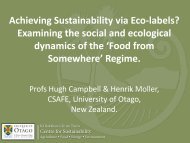Book of Abstract (incl. addendum) - IFSA symposium 2012
Book of Abstract (incl. addendum) - IFSA symposium 2012
Book of Abstract (incl. addendum) - IFSA symposium 2012
You also want an ePaper? Increase the reach of your titles
YUMPU automatically turns print PDFs into web optimized ePapers that Google loves.
<strong>Abstract</strong> <strong>of</strong> plenary sessions:<br />
Producing and reproducing farming systems.<br />
New modes <strong>of</strong> organization for sustainable food systems <strong>of</strong> tomorrow<br />
Achieving Sustainability via Eco-labels? Examining the social and ecological<br />
dynamics <strong>of</strong> the ‘Food from Somewhere’ Regime<br />
Keynote speaker:<br />
Pr<strong>of</strong>essor Hugh Campbell<br />
Department <strong>of</strong> Sociology, Gender and Social Work<br />
University <strong>of</strong> Otago, NZ<br />
hod.sqsw@otago.ac.nz<br />
In this address I want to examine the rather contentious and potentially challenging ‘middle zone’ <strong>of</strong><br />
activity in global food relations that has opened up around what I term the ‘Food from Somewhere’<br />
regime. Around 20 years ago, at the conclusion <strong>of</strong> the GATT Uruguay Round <strong>of</strong> global trade<br />
negotiations (and subsequent formation <strong>of</strong> the WTO) a great deal <strong>of</strong> attention was given by scholars to<br />
the implications <strong>of</strong> the establishment <strong>of</strong> a neoliberal world order for food. Scholars like Philip<br />
McMichael suggested, at that time, that the world was now about to be progressively absorbed into a<br />
Corporate Industrial Food Regime, supported by neoliberal governance systems, operated by transnational<br />
corporate capital and trading in industrial, mass-produced and highly substitutable<br />
commodities. He termed this new regime: ‘Food from Nowhere’. In opposition to this emerging regime<br />
in world food relationships, some agri-food scholars pointed to the need to encourage and recognize<br />
local food systems, local food cultures, new social movements around local food, farmers markets,<br />
urban gardening and other initiatives that might help form some kind <strong>of</strong> sustainable locally-embedded<br />
alternative to Food from Nowhere. At the time, many <strong>of</strong> us were comfortable with the assumption that<br />
world food politics was configured around two poles – the globalizing, industrial, corporate<br />
(capitalist?) pole represented by McMichael’s Food from Nowhere, and the local, embedded, more<br />
sustainable pole <strong>of</strong> local foods.<br />
My own scholarly path has taken me into the uncomfortable ‘middle zone’ in between those two<br />
poles. One <strong>of</strong> the curious dynamics <strong>of</strong> the last 15 years has been the rise <strong>of</strong> globally-traded foods that<br />
make sustainability claims. Commencing with certified organic, the global trade in organic foods has<br />
<strong>of</strong>ten involved large farms, large corporations (both in agriculture and in retailing), highly<br />
pr<strong>of</strong>essionalized auditing organisations and has captured increasingly large segments <strong>of</strong> high value<br />
markets in wealthy countries. The food that is traded within this middle zone is positioned to sell for<br />
higher prices due to its overt quality claims that derive from measures <strong>of</strong> sustainability, ec<strong>of</strong>riendliness,<br />
the appropriateness <strong>of</strong> social conditions <strong>of</strong> production (like Fair Trade), or having been<br />
derived from a desirable location in the world. I have termed this ‘Food from Somewhere’ to<br />
distinguish it from its alternative - Food from Nowhere. Food from Somewhere might come from<br />
somewhere but it arguably has quite different dynamics and qualities to local foods. It is globally<br />
traded, through highly evolved food retailing systems and supported by large export corporations,<br />
highly successful retail chains and pr<strong>of</strong>essional audit organisations. The existence <strong>of</strong> the Food from<br />
Somewhere regime is highly challenging to those <strong>of</strong> us who held onto a comfortable binary separation<br />
<strong>of</strong> the world food system into that traded in the globalized corporate industrial world <strong>of</strong> food (most<br />
definitely NOT sustainable) and that which operates in local, more socially and culturally embedded<br />
food relationships (which we assumed would be MORE sustainable). Where do Foods from<br />
Somewhere fit in our understanding <strong>of</strong> sustainable food systems? Are they ‘tick box’ schemes that<br />
allow producers to claim environmental benefits while maintaining conventional production practices?<br />
Are they a shallow exercise in corporate ‘greenwashing’? Or do they actually have transformative<br />
potential to change the economic, environmental and social character <strong>of</strong> farming? These questions lurk<br />
behind the eco-labels that we are faced with when we shop at Sainsburys or Natural Foods stores.<br />
To start to answer these questions, I will consider the transformation <strong>of</strong> food production in New<br />
Zealand. Some agri-export industries in New Zealand have become enthusiastic participants in the<br />
Food from Somewhere Regime, establishing new measures <strong>of</strong> quality like certified organic, GLOBAL<br />
G.A.P. or other industry-specific eco-labelling schemes. In the last 15 years, food export industries in<br />
New Zealand have made a significant transition from almost total absence <strong>of</strong> any eco-labelling or<br />
8











